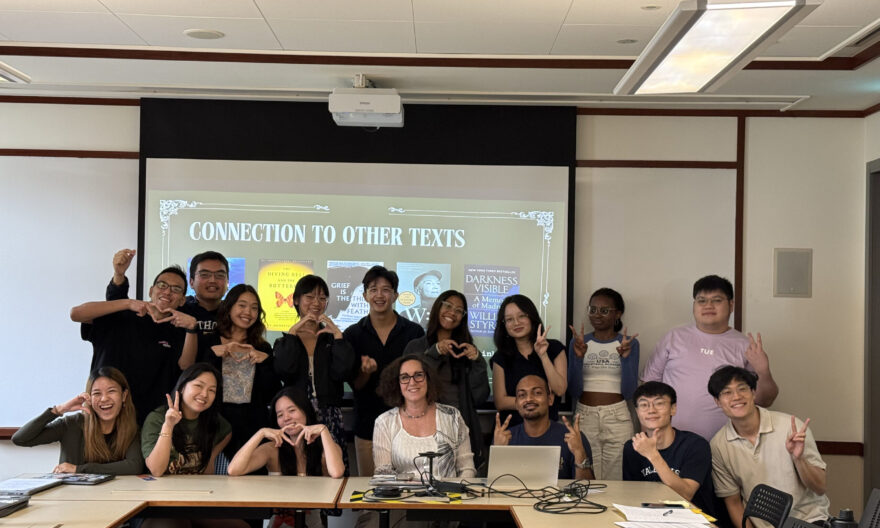Yale-NUS faculty members lauded at Research Recognition Awards
Asst Prof Schupmann and Assoc Prof Johns receive the Early Career Award and Faculty-Student Collaboration Award respectively
 Images provided by (from left to right) Asst Prof Schupmann and Assoc Prof Johns.
Images provided by (from left to right) Asst Prof Schupmann and Assoc Prof Johns.
The annual Research Recognition Awards honour Yale-NUS faculty members for their outstanding research achievements and contributions to the academic community. This prestigious award is given to those whose work has exemplified excellence in advancing their field, earned recognition from national or international professional bodies, and have demonstrated, or hold the potential for, significant impact beyond academia.
This year, Assistant Professor of Social Sciences (Philosophy, Politics, and Economics) Benjamin A Schupmann received the Early Career Award for his book’s significant contributions to democratic and constitutional theory. As a political theorist, Asst Prof Schupmann studies constitutions, considering questions about how constitutions should be designed to make them the best form of a constitutional institution (a government institution created by a constitution). His book, Democracy Despite Itself: Liberal Constitutionalism and Militant Democracy, is a culmination of his research work at Yale-NUS College.
In the book, Asst Prof Schupmann looks at the problems that a lot of democracies are suffering from, from around the world. He shared, “Anti-democrats are popular and they get elected into public office. Once in office, they use the power of office to undermine democracy in the constitution. This is a pattern we see a lot in history. It’s happened a lot in the last 15 years, but it’s also happened in the past”. After looking at democratic backsliding, he explores what features a democratic constitution ought to have such that it can be defined as a democracy, before looking at different mechanisms that can be put into constitutions to prevent the backsliding happening around the world from recurring in the future.
His inspiration for the book came from his prior research work on Carl Schmitt, a German constitutional theorist. “He would write really short things, and I was trying to put all of those together into one complete theory. I realised a lot of the things that he was talking about kind of paralleled or resonated with events that were happening in a lot of states around the world today – like Hungary and India, and later the United States. I didn’t want to keep working within the constraints of his work. I wanted to look at some of the ideas, take their spirit and move beyond them.”
On the Early Career Award, Asst Prof Schupmann commented, “I’m really honoured to receive it. I’d like to thank the committee and the people involved in the book in some way, shape, or form along the way. No work happens in a vacuum. This would not have been possible without the help of a lot of people. I’m also grateful to the College for providing the support for helping me get to this stage”.
The Faculty-Student Collaboration Award was given to Associate Professor of Science (Life Sciences) Philip Johns for his mentorship of and collaborative research with Haaken Bungum (Class of 2021) on the study of otters’ social behaviour, which has contributed important insights to the field.
Assoc Prof Johns’ research interest is in animal behaviour, specifically in urban wildlife and he looks at otters, hornbills, and other animals in Singapore, examining their behaviour and the associated questions deriving from their observed behaviour. In his research on otters, he has worked with various students to study otters’ social behaviour, such as cooperative group foraging and fights between families of otters. Haaken is one of these students.
Haaken looked at Singapore otters’ feature of being cooperative breeders. “That means that grown otter pups stay with a family as non-reproductive “helpers” and help rear their younger siblings. Most other species of otters are largely asocial, or live in small family groups. Our otters have families of up to 20 animals, with a dominant breeding pair, and they do a lot of things as a group,” explained Assoc Prof Johns. Working closely with local otter watchers in Singapore, Haaken looked at how often otter families have more than one reproductive female, and why and when otters occasionally display aggressive behaviour to monitor lizards – attacking and sometimes even killing them.
On receiving the award, Assoc Prof Johns remarked, “The award is for collaborating with students, and I think that’s something that Yale-NUS does really well. We work really closely with our students, as a consequence of being a small liberal arts college, and that close mentoring promotes a certain kind of scholarship”.
The journey continues for the two Yale-NUS faculty as they embark on further research. For Assoc Prof Johns, his team is looking at hybridisation in the otters in the region, which refers to the breeding of two distinct otter species that results in offspring. “Hybridisation raises all sorts of fun questions, both ecological and evolutionary. Just being able to describe the extent of hybridisation in the genome is important, and it should give us tools so we can look at hybridisation throughout the region.” Meanwhile, Asst Prof Schupmann recently finished an article that is a spin-off from his book. The article is about the work on militant democracy by one of Schmitt’s PhD students, Otto Kirchheimer. Asst Prof Schupmann also has plans to contribute more articles on militant democracy in the next few years. “Given the state of democracy around the world, I’ll probably keep working on this for a while”.




